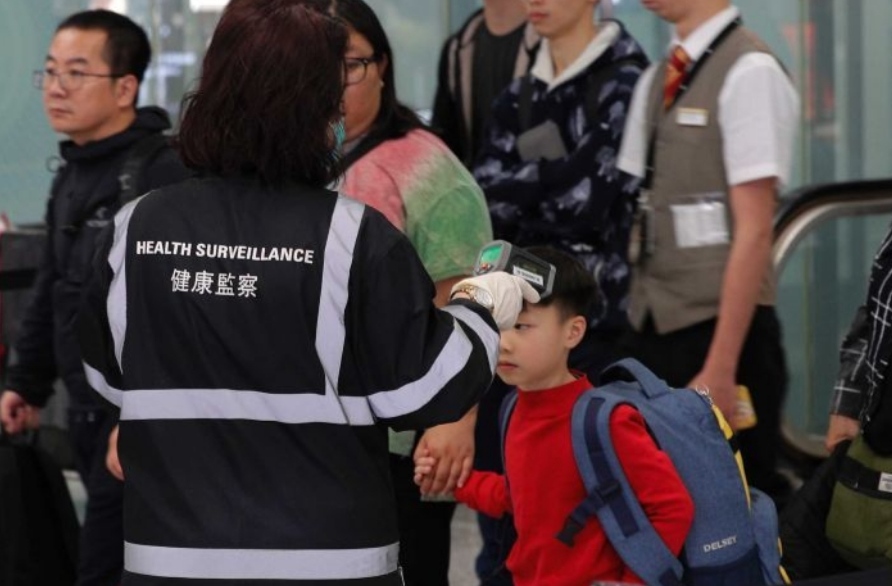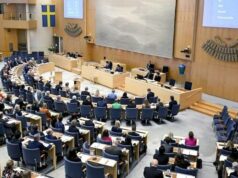How Australia will enforce coronavirus self-isolation rules for overseas arrivals

From $50,000 fines to six months’ jail time, states and territories have different penalties for breaching the 14-day quarantine rule
A staff member in protective medical clothing consults with arriving passengers at Brisbane international airport. Australia has strict new border measures to contain the spread of coronavirus. All overseas arrivals are required to self-isolate for 14 days.
In response to the coronavirus pandemic, Australia has introduced mandatory 14-day self-isolation for people arriving from overseas. But how will this be enforced?
New South Wales
Under the NSW Public Health Act, anyone who enters Australia from another country will be subject to a 14-day self-isolation quarantine, with fines of up to $11,000 or six months’ prison if they do not comply.
“Obviously the NSW government – indeed all governments around the country – are not wanting to impose penalties on people,” health minister Brad Hazzard said. “What we’re looking for is cooperation.”
The order banning mass gatherings of more than 500 people to stem the spread of coronavirus has also been made under the Public Health Act, with fines of up to $55,000 for corporations who breach that ban and $27,500 for each additional day the event continues.
Coronavirus: people not complying with new Australian self-isolation rules could face fines
The order explicitly excludes gatherings including the ordinary operation of a school, university, Tafe and educational college; the ordinary conduct of a court; public transport; and employees attending a workplace. It will remain in place until 14 June.
Victoria
The Victorian government enacted a four-week state of emergency under the Public Health and Wellbeing Act 2008, extending from 12pm Monday to midnight 13 April unless extended.
The state of emergency declaration gives authorised officers, such as police, at the direction of the chief health officer, the power to detain people, restrict movement, prevent entry to premises or provide “any other direction an [authorised officer] considers reasonable to protect public health”.
Under the directive signed by the chief health officer, it is an offence for a person arriving from overseas to fail to go into self-isolation for 14 days. People must not leave the premises where they are self-isolating except for the purpose of obtaining medical care or supplies; in any other emergency situation; or in circumstances where it is possible to avoid close contact with other persons. They also cannot allow visitors into their home.
The penalty for failing to comply is a fine of almost $20,000 for individuals and $100,000 for companies.
“We don’t anticipate having to be fining people,” Victorian premier Daniel Andrews said on Monday. “To this point people have been cooperative.”
Flight attendants and citizens or permanent residents of a Pacific Island are exempt.
The same directive bans mass gatherings of more than 500 people, exempting schools, airports, public transport, markets, workplaces, courts, prisons and youth justice facilities, parliament and public places where people are moving through, such as Bourke Street Mall and Federation Square.
Andrews said the powers could be extended to include the lockdown of whole suburbs.
Queensland
People arriving in Queensland from overseas will be issued with a notice requesting them to voluntarily self-isolate for 14 days. If they breach that notice, the Queensland government says it will “initially work closely with the person to ensure they not only understand their obligations, but also the importance and seriousness of self-quarantine under the current global circumstances”.
If that fails, the notice is enforceable under the Public Health Act 2005 with fines of up to $13,345.
Queensland has been in a state of emergency since late January and can use those powers to enforce compliance if necessary – but it has repeatedly stated that it is aiming for willing community cooperation.
A Brisbane airport staff member consults with passengers arriving from overseas.
Australian Capital Territory
The ACT declared a public health emergency on Monday in response to Covid-19, which gives the chief health officer powers to enforce quarantine provisions, to order the evacuations of public areas, to restrict access to an area, and even to force someone to undergo medical examination.
Under those powers, anyone who breaches the order for travellers to self-isolate for 14 days upon arrival in Australia could face a $8,000 fine, under the Public Health Act 1997.
Mass gatherings will be policed under the same legislation.
Western Australia
Western Australian invoked powers under the Emergency Management Act at midnight on Sunday to enforce self-isolation requirements.
Under the act, travellers who breach the 14-day self-isolation order are liable for a $50,000 fine or possible jail time.
The ban against mass gatherings is enforced under the same legislation, with the same penalty to apply.
Northern Territory
Self-isolation requirements will be enforced under the Notifiable Diseases Act, which carries penalties of $1,256 or six months’ prison for breaching a public health order.
Di Stevens, the acting chief health officer, said she expected the community would monitor and police each other to ensure isolation orders were followed.
Mass gatherings of more than 500 people have been banned under the Public and Environmental Health Act.
That does not include schools, universities, public transport or attending the Darwin markets, chief minister Michael Gunner said.
Travel to remote communities for everyone but essential services, supply runs and maintenance runs has also been banned.
Gunner said people in remote communities were not being “left alone” during the coronavirus outbreak and would have everything they needed to be healthy and safe.
“To protect you, we are keeping nonessential people away from you,” he said. “If you don’t need to travel out of your community, then don’t. Just like the rest of us you are safer in your home community.”
Australian leaders consider ban on groups of more than 100 to try to halt coronavirus
South Australia
South Australia declared a public health emergency on Sunday. Premier Steven Marshall told AAP the declaration would allow public health officers to take “all the necessary actions required to keep the people of South Australia as safe as we possibly can”.
The SA parliament this month passed new laws giving public health officers greater powers to order a person to self-isolate, be detained in a particular place or agree to medical testing.
Failure to comply with orders under the revised Public Health Act 2011 carries a maximum fine of $25,000.
Tasmania
Tasmania was the first state to ban cruise ships from coming into port, and introduced measures banning mass gatherings of more than 500 people, and requiring travellers to self-isolate for 14 days, from midnight on Sunday.
Under the Public Health Act in Tasmania, the maximum fine for breaching an order to self-isolate is $8,400.
The ban on mass gatherings does not include markets, like Hobart’s Salamanca market, on the justification that those events involve people moving through and are therefore unlikely to result in someone having sustained close contact with a stranger. However school fetes and assemblies have been banned.



